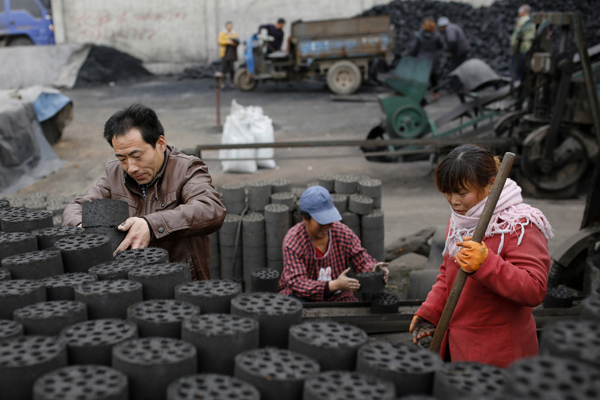 |
|
A man loads coal briquettes onto his tricycle cart at a coal process station in Tangxian in North China's Hebei province on Nov 27, 2014. [Photo/IC] |
Hebei, a neighboring province of Beijing, will put stricter control on the use of coal in an effort to curb severe air pollution in the region, reported Xinhua News Agency on Wednesday.
Bulk coal consumption will be banned in 18 counties that neighbor Beijing by the end of next year, according to a new action plan issued recently by the anti-air pollution working group of Hebei.
The plan aims to apply central heating or clean energy heating systems in urban areas, and replace coal with electricity or natural gas as the source of heat in rural areas.
Bulk coal consumption has been proven to be more polluting than coal consumption in industries, according to the recently released China Air Quality Management Evaluation Report.
For example, bulk coal consumption, including those used in households for heating in winter, account for less than 10 percent of the total consumption in the Beijing-Tianjin-Hebei region.
But half of the total airborne pollutants emitted were generated from bulk coal consumption, said Wang Lisha, one of the authors of the assessment report, in an earlier interview.
Coal?will not?be used as a fuel since November 2017, while power plants consuming petroleum coke – a petroleum refining byproduct that is high in contaminants – will no longer be built, according to the plan.
The ban on coal will exclude coal-powered electricity plants, central heating supply factories and enterprises using coal as raw materials.
Hebei is home to five of China's top 10 polluted cities in August, according to the monthly report published by the Ministry of Environmental Protection.
Stricter control on coal consumption would facilitate the green growth of industries and also help China reduce greenhouse emissions to offset global warming, said Xie Hongxing, secretary general of the Clean Air Alliance of China, a green organization based in Beijing, in an earlier interview.
China has promised to reach the carbon emission peak by 2020, in a bid to deal with climate change, and has undertaken a mix of measures such as expanding the use of green energy, such as solar power, to reduce coal consumption.
